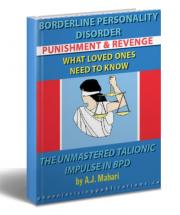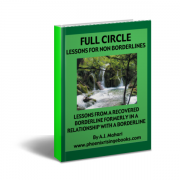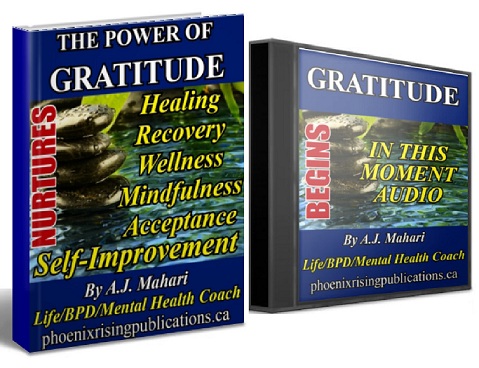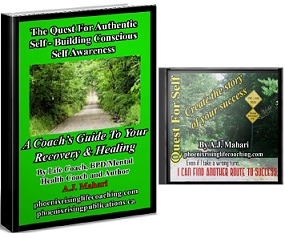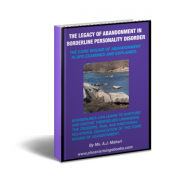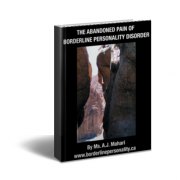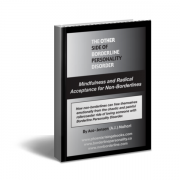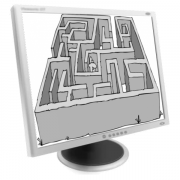Optimism
There is reason to have optimism that Borderline Personality Disorder does not have to be a life sentence.
There is reason to have optimism and hope about creating change in your life if you have Borderline Personality Disorder. It is important for those with BPD and those who are family members, loved ones, ex or relationship partners or friends of those with BPD to note that no one can change or rescue someone from Borderline Personality Disorder. The person diagosed with BPD has to want to change and has to seek professional help to find that process of change that can lead to the road to recovery.
Generally, optimism is defined as actively believing that good ultimately prevails over evil and refers to expecting the best possible outcome of any circumstance or experience.
Given that not all of us have agreed upon definitions of what "good" and "evil" are one can only be optimistic to the degree that one has defined this personal philosophy of measured "good" and measured "evil" within their own belief system. If you have not given these opposites much thought I encourage you to do just that now. Too many of us, for way too long in our lives, borderline, or not, just take at face value what we've been told "good" and "evil" mean, or are. How many people have been given poor definitions of these terms by rather unhealthy and or unbalanced people? It is crucial that you think about your own values and philosophy where the concepts of "good" and "evil" are concerned.
Why? -- Well, for example, if you were told as a child that everything that you did (that your parents didn't like) was "evil" you will be feeling like a pretty "evil" person about now. Your idea of evil will be based upon what your parents idea of "evil" was. Ask yourself, in keeping with this example, "If my parents didn't like what I chose to do, how does that make me evil?" "What does this mean that my parents believed evil is/was"? If you parents labeled you "evil" because you did something that you wanted to do, like, ride your bike, for example, when they didn't want you to, does that mean that riding a bike is "evil"? Does that mean that you were "evil" because you rode a bike?
Words and even deeper, concepts like "good" and "evil" so define the parameters within which we learn to feel and believe certain things about ourselves. Therefore it is so important to re-define these concepts as a part of your healing. I have been told by many borderlines that they are just "monsters". What is a "monster"? What does someone mean when they call themselves a "monster"? I suspect that it means they did not behave as well as they were expected to. Does that make them a "monster"? Do you not think that there are very good reasons sometimes (that are OKAY) as to why we do not live up to the expectations of others and therefore as to why we end up with all these negative concepts as to what we are?

If you believe that you are "evil" then you are "evil". You will shape your expectations based upon this belief in ways that will create your experience. You will be more likely to act in a way that lives up to that expectation. If you question the meaning of the label that you were given by others (or that you gave yourself as the result of rather illogical thinking) than you can begin to change how you act, which will impact how you feel because you will free yourself from an "faulty-expectation" of your false-self that you've hung onto in the absence of anything else to put in its place.
Here lies the most central reason to be optimistic. There is just so much about being borderline that has all to do with the past. A very big part of healing from BPD involves unwinding this very past - the unresolved issues of what I call the core wound of abandonment that has become a defective dictionary by which you not only live your life but by which you also erroneously define yourself -- a false self that (if you have BPD) has taken the place of your lost authentic self - the self you likely think you know or that you may be aware that you really don't know - your lost authentic self - awaits your reclamation of it. An optimistic reality about this lost false self is that recovery from BPD is the journey of self reclamation that will take you From False Self To Authentic Self.
On the journey that is the process of recovery it is necessary to not only be optimistic about getting well but also to know that what is necessary for you to take this journey is that you make a choice to face your abandoned pain and to really do the work in therapy necessary to get in touch with and begin to work through your rage whether you are in touch or aware of that rage right now or not.
You can expect change and growth and healing if you are open to them. You can be optimistic because how you feel and or how you view yourself today -- does NOT have to be the way it will ALWAYS BE or the way that you will ALWAYS feel.
Just as is the case with "good" and "evil" most borderlines are trapped in an illogical and constricted thought-process that only defines things according to what its opposite is. This is black and white, all-or-nothing thinking. It is defeatist thinking. It is thinking that is based upon accepting what others have always told you. It is not based upon healthy challenges to conclusions and interpretations (most of which are actually misinterpretations). Just because you were labeled "bad" does not mean you are "bad". If you do something "bad" it does not MAKE YOU bad. There needs to be a separation inserted in your thinking (and you need to work at thinking for yourself as you cognitively restructure your thought overall thought patterns) between actions and the state of your being. "Good people" can do "bad things" and "bad people" can do "good things". There are few mutually exclusive realities in the scope of behaviour and personality in life.

Borderlines need to strive for the middle -- the grey -- or as Linehan refers to it in her DBT Skills training, "Wise Mind" - the middle ground that exists between the black and the white. Next time you say to yourself, "I am hopeless" -- reframe that and say this instead: "I am not feeling very hopeful right now but I believe that there is hope for me." This allows you to feel what you feel but to feel it without allowing that feeling to be the sum total of your entire existence.
You are defined by much more than what you say and do, though what you say and do does impact how others will experience you and define you. And you are responsible for how you choose to treat others regardless of how you may feel someone else is treating you. Even if you feel justified somehow in the ways that you are treating someone else because you may feel they aren't being fair with your or that they will abandon you, the bottom line is that you are personally responsibile for each and every choice that you make - even the choices that you may not be so aware, yet, that you are indeed making. Taking personal responsibility for yourself and your words and actions will increase your understanding and increase your reason to be optimistic that you are learning valuable lessons. Lessons that can help you do the work to recover.
Be optimistic if you are borderline. Why? Simply because being borderline gives you an opportunity to learn so much more. Most borderlines are highly intelligent people. Most borderlines have a wealth of talent, skill and competency waiting underneath the illogical beliefs that they are "no good". Should you decide to heal you will be amazed at what lies within you.
One of the most profoundly-precious things I have learned about life and about myself in my healing from BPD is that there are such wonderful and exciting challenges to be experienced through the living of a life of health and optimism -- contradictions are so much a part of the human experience. There is "good" in "evil" and "evil" in "good". Good and evil can co-exist. I have been so freed through coming to know that feelings and perceptions/interpretations were not meant to stand out alone from the entire sum of one's experience and being. When one is borderline often this is the very way one is trying to live -- by putting everything and everyone into some place where he/she/it belongs. That truly does take the joy out of the natural ups and downs, joys and sorrows that make up the average "healthy" live as it is lived.
More and more I am hearing from borderlines who report that they are much better and or healed. I am not some weird accident or some singular-miracle -- NO! It is possible to heal from BPD and to move from the black and white into the full spectrum of colour and experience that is referred to as the 'grey'.
I think also that the internet itself and the many wonderfully open and caring people who are on-line that give even more reason for borderlines (and those who care about them) to be optimistic. There is not only a growing wealth of information about BPD on-line but there are support groups and personal accounts and stories. Finally, slow as it may be, BPD, is becoming a much more known and better understood personality disorder.
Remember, in the end, whether you are optimistic or not is entirely up to you. It is a choice that you can freely make. With choice comes opportunity and responsibility. It has been through the embracing of both that I have been able to leave BPD behind. You can too! Be optimistic. In fact, I think it take far more time and energy to be pessimistic. Optimism is the seed that planted will reap your harvest of change.
Choosing to be optimistic about creating healthy change in your life through what can be long, painful, and difficult therapy is a choice, that if you haven't made it yet, awaits you. It is something that you can choose when you are ready. There is reason for so much optimism because where there is life there really is hope.

© Ms. A.J. Mahari February 15, 2000-2016 with additions November 16, 2008-2016
A.J. Mahari is currently writing a memoir about her life and experience as a person who had two parents with Borderline Personality Disorder, as a person who was diagnosed herself with BPD at the age of 19 and from her perspective as someone who has recovered from BPD. There is a new section on her BPD Blog called The Diary - My Borderline Years where A.J. Mahari shares snipets of experience from her own life that is will give you just a taste of what her memoir will include.
Audio Program "Preparing For Recovery From BPD" Parts 1 & 2 by A.J. Mahari
Audio Program Rage Addiction in BPD by A.J. Mahari (sold separately or packaged with Mahari's Ebook, "Rage and BPD")
- Purchase all 3 of ebooks for NON BORDERLINES
- Non Borderlines - You can purchase 6 ebooks packaged together with or without audio.
- Those with BPD and/or Non Borderlines can purchase A.J. Mahari's 3 "Core Wound of Abandonment" series ebooks packaged together with or without audio.






